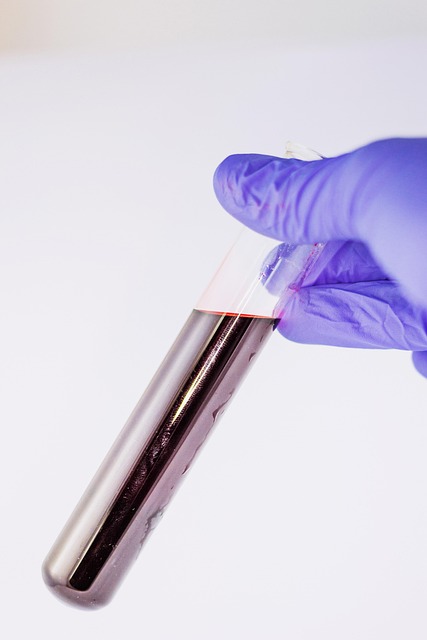The thyroid gland, crucial for overall well-being, produces hormones that regulate metabolism. A thyroid health test service assesses hormone levels, detecting imbalances like hypothyroidism or hyperthyroidism. Early detection through regular checks is vital. Signs of thyroid problems include fatigue, weight changes, and temperature fluctuations. Dietary changes, exercise, and stress management support optimal thyroid function. Consulting with a doctor about thyroid tests facilitates diagnosis and management under expert guidance.
Unsure about your thyroid’s role in overall health? This comprehensive guide is designed to demystify thyroid function and offer practical tips for optimal well-being. From understanding the basics of thyroid hormones to identifying potential red flags, we explore dietary changes, lifestyle adjustments, and when to seek professional help with a thyroid health test service. Take control of your health by empowering yourself with knowledge.
- Understand Thyroid Function Basics
- Identify Thyroid Health Red Flags
- Dietary Changes for Optimal Thyroid
- Lifestyle Adjustments to Support Thyroid
- When to Seek Professional Help: Thyroid Health Test Service
Understand Thyroid Function Basics

The thyroid gland, located at the base of your neck, plays a pivotal role in maintaining overall health by producing hormones that regulate metabolism and influence nearly every cell in your body. These hormones, thyroxine (T4) and triiodothyronine (T3), are responsible for controlling energy production, heart rate, digestion, muscle strength, and even mood. Understanding the basics of thyroid function is the first step towards optimizing your thyroid health.
A thyroid health test service can help you assess your current thyroid state by measuring the levels of T4 and T3 hormones in your blood. This is particularly important as symptoms of thyroid imbalances, such as fatigue, weight changes, and mood swings, can be attributed to various other conditions. Knowing whether you have a hypothyroid (underactive) or hyperthyroid (overactive) condition paves the way for discussing therapeutic options for thyroid imbalances, including lifestyle adjustments like a healthy diet that can improve thyroid function, and medical interventions if necessary. Additionally, regular annual thyroid checkups, as advised by healthcare professionals, are crucial to detect any potential issues early on, underscoring the importance of why do I need an annual thyroid checkup.
Identify Thyroid Health Red Flags

Many people overlook subtle signs and symptoms that could indicate underlying issues with their thyroid health. It’s essential to be aware of these red flags, as early detection can significantly impact treatment outcomes. A thyroid health test service is crucial in identifying any abnormalities, so it’s wise to familiarize yourself with the common indicators. Pay attention to persistent fatigue, changes in weight, and unusual fluctuations in body temperature. These could be signs you need a thyroid test, indicating potential hypothyroidism or hyperthyroidism.
Additionally, keep an eye out for symptoms like dry skin, hair loss, constipation, and increased sensitivity to cold or heat. If you experience these signs you may need a thyroid test, it’s worth exploring further. Discuss with your doctor what questions to ask about thyroid tests and thyroid blood tests. They can guide you through the process of diagnosis and offer personalized advice for managing your thyroid health effectively.
Dietary Changes for Optimal Thyroid

A holistic approach to thyroid health management begins with dietary changes. Incorporating nutrient-rich foods and avoiding inflammatory and goitrogenic substances is key. A balanced diet, rich in lean proteins, whole grains, healthy fats, and a variety of fruits and vegetables, supports optimal thyroid function. Foods like sea vegetables (e.g., kelp, seaweed), nuts, seeds, and coconut oil are beneficial due to their iodine and antioxidants content.
On the contrary, certain foods can negatively impact thyroid health. Goitrogens, found in raw cabbage, broccoli, cauliflower, and brussel sprouts, may interfere with thyroid hormone synthesis. Additionally, inflammatory foods like processed meats, refined sugars, and trans fats should be limited. Preparing for a thyroid test by adopting these dietary changes and understanding how to prepare for thyroid tests can facilitate accurate assessment of your thyroid health status. Remember, a holistic approach also involves regular exercise and stress management, which are crucial for maintaining a healthy thyroid and exploring therapeutic options for thyroid imbalances when necessary.
Lifestyle Adjustments to Support Thyroid

Maintaining a healthy lifestyle is an integral part of supporting your thyroid function. Simple adjustments in daily habits can significantly impact your thyroid’s performance. One effective strategy is to incorporate regular physical activity into your routine. Exercise helps regulate hormones, including thyroid-stimulating hormones, which play a crucial role in metabolism and energy production. Aim for a balance of cardiovascular exercises and strength training to keep your body active and agile.
Additionally, managing stress levels is essential for optimal thyroid health. High-stress conditions can disrupt the fine balance of hormones, affecting thyroid function. Techniques like meditation, deep breathing exercises, or yoga can help calm the mind and reduce stress hormone production. A good night’s sleep is another critical aspect; aiming for 7-9 hours of uninterrupted rest each night allows your body to recover and maintain healthy hormone levels, including those that regulate your thyroid. Consider these lifestyle changes as a holistic approach to managing thyroid conditions and enhancing overall well-being, complementing any professional thyroid health test service or guidance from healthcare professionals.
When to Seek Professional Help: Thyroid Health Test Service

If you suspect something might be amiss with your thyroid gland, it’s crucial to know when to seek professional help. Many individuals overlook thyroid health issues, assuming they are merely signs of aging or stress. However, persistent symptoms such as fatigue, weight changes, dry skin, hair loss, or irregular periods could indicate a problem that requires medical attention.
A thyroid health test service offers an essential screening tool to diagnose and address any thyroid-related concerns. This service typically involves a simple blood test that measures your hormone levels, helping healthcare professionals determine if you need treatment for hypothyroidism (underactive thyroid) or hyperthyroidism (overactive thyroid). Given the impact of thyroid hormones on various bodily functions, early detection and intervention through a thyroid health test service can be life-changing, ensuring optimal wellness. Moreover, with proper guidance from medical experts, making dietary adjustments, such as incorporating nutrient-rich foods, can also contribute to improving thyroid function as part of a holistic approach to thyroid health.
Improving thyroid function involves a multifaceted approach, from understanding basic principles and identifying red flags to adopting dietary changes and lifestyle adjustments. Regularly assessing your thyroid health is crucial, and considering a thyroid health test service can provide valuable insights into your overall well-being. By combining knowledge with proactive steps, you can take control of your thyroid’s health and enjoy improved vitality.
